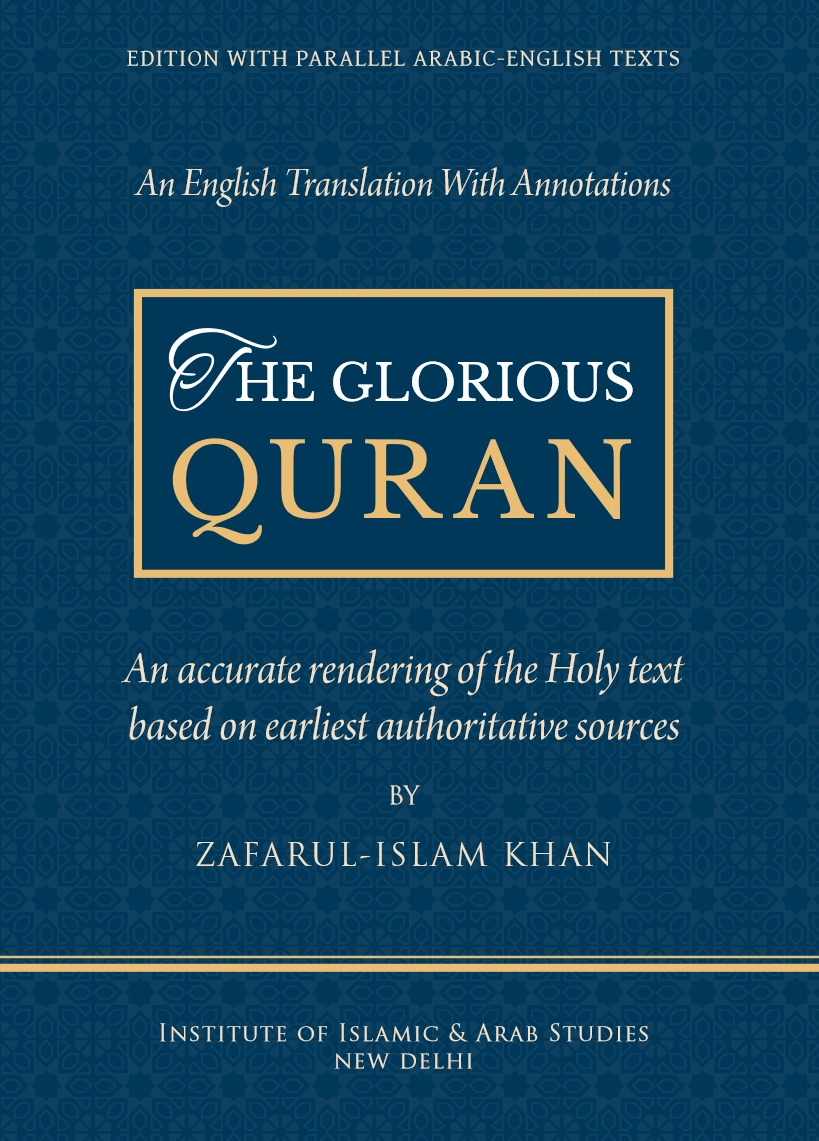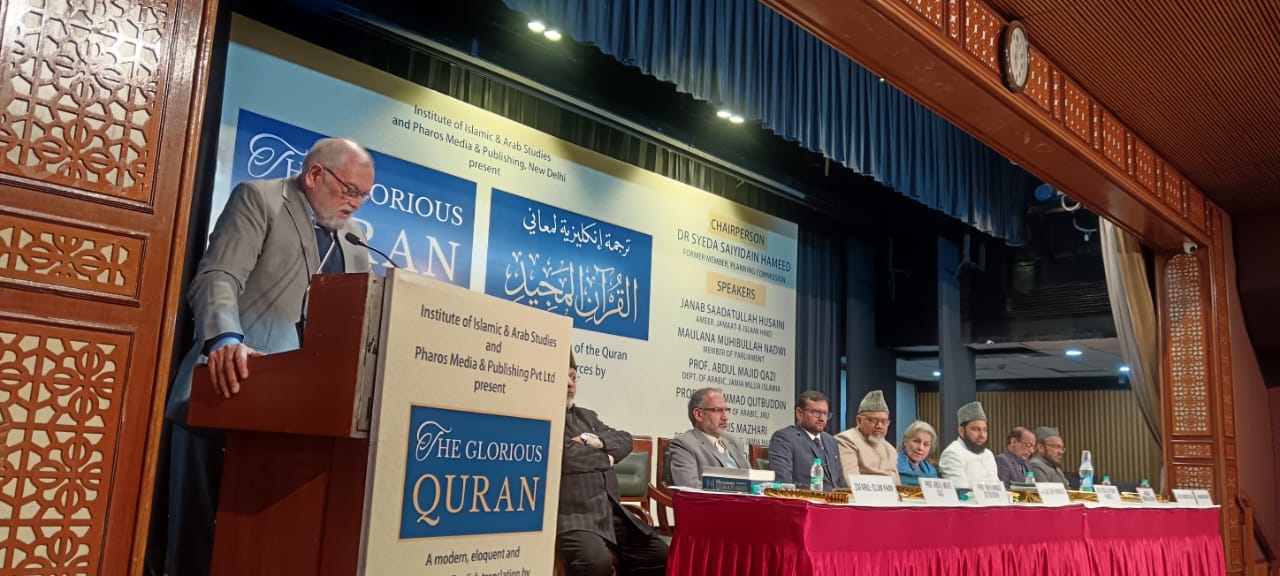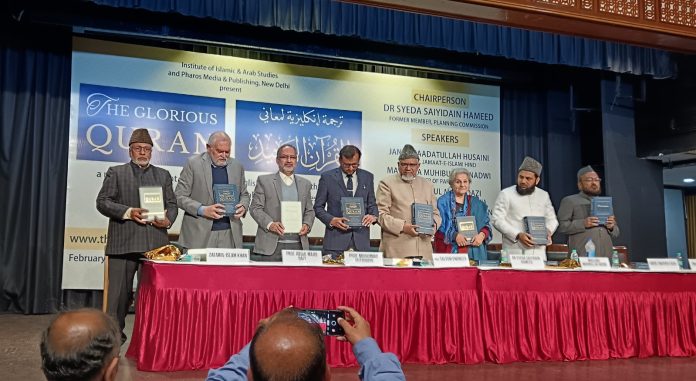– Zillur Rahman Haider
New Delhi: The latest translation of the Holy Quran into English was formally launched at the India Islamic Cultural Centre here Saturday. The event drew a diverse audience, encompassing scholars, religious leaders, students, and community members, underscoring the significance of the message of Islam for the present times.
 The event commenced with recitation from the Holy Quran and its translation, setting the tone for the proceedings, and the recitation of a poem by Mahirul Qadiri in which the Quran laments that Muslims have forsaken it.
The event commenced with recitation from the Holy Quran and its translation, setting the tone for the proceedings, and the recitation of a poem by Mahirul Qadiri in which the Quran laments that Muslims have forsaken it.
Dr. Zafarul-Islam Khan, the translator and commentator of this work titled “The Glorious Quran,” spoke at length about the need of a modern translation in simple English which should be accessible to everyone in these times when English has spread to all corners of the world but available English translations do not meet today’s needs nor do their commentaries answer questions raised in recent times. Such a translation, in the translator’s view, will facilitate Muslims’ compliance with Allah’s commands and also offer a window for non-Muslims to understand better the Islamic holy book.
The translator, Dr Khan, is a well-known Islamic scholar who studied at Al-Azhar and Cairo Universities and obtained his PhD from Manchester University in UK. He has written and translated over 50 books in Arabic, English and Urdu. He said this annotated translation is available in two editions: one with parallel Arabic text and its translation and the other with only the English translation. Both versions have footnotes and appendices specially written by the translator for this work. He also mentioned that this translation is now also available online at https://thegloriousquran.net/ though the Net edition is still in progress.
 Dr. Khan shared his inspiration for translating the Quran into English. He explained that he felt the need to undertake this project because, although there were many translations available – initially done by Orientalists and later by some Muslims – he found that these translations suffered from many mistakes and short-comings. The translation by Abdullah Yusuf Ali, in particular, became very popular among Muslims, but Dr. Khan realised since early 1980s that there were numerous errors whenever he needed to quote translations of specific verses in his speeches or writings. This prompted him to resolve that one day he will publish a corrected version of Abdullah Yusuf Ali’s translation.
Dr. Khan shared his inspiration for translating the Quran into English. He explained that he felt the need to undertake this project because, although there were many translations available – initially done by Orientalists and later by some Muslims – he found that these translations suffered from many mistakes and short-comings. The translation by Abdullah Yusuf Ali, in particular, became very popular among Muslims, but Dr. Khan realised since early 1980s that there were numerous errors whenever he needed to quote translations of specific verses in his speeches or writings. This prompted him to resolve that one day he will publish a corrected version of Abdullah Yusuf Ali’s translation.
Dr. Khan became emotional while recalling how the translation work began. He said that in 2010 he performed Haj with his wife. There, in the Holy Mosque in Makkah, he resolved that he will no longer delay this work. Upon returning home, he started the revision of the translation in January 2011. Initially, progress was slow as he balanced it with his other responsibilities. However, from 2020 to 2023, he entirely dedicated himself to complete this project. So much so that during this period he stopped reading newspapers.
Dr. Khan said that during this work only the most authentic and earliest Arabic sources were used and great effort was made to present the translation of the Quran and introduction of Islam as they were understood by the earliest Muslim scholars and commentators of the Holy Quran. He clarified that he eschewed any philosophical, jurisprudential (fiqhī) or linguistic discussion which eventually cause differences and disunity among Muslims. He said though his work started as an attempt to correct the translation of Abdullah Yusuf Ali but it slowly evolved into a new translation with lengthy introduction of the Quran, a chapter on the life of Prophet Muhammad ﷺ and several indices including Islamic terms and a Quranic index which has made it a comprehensive guide of the Holy Quran and Islam.
He further stated that although he knows the Arabic language very well – like native Arabs – yet he conducted rigorous research and meticulous lexical work to understand meanings of words, terminologies and terms used in the Holy Quran.
The launch ceremony was presided over by Dr. Syeda Syedain Hameed, former member of the Planning Commission of India. The speakers included Prof. Salim Engineer, Vice President of Jamaat-e-Islami Hind; Maulana Muhibbullah Nadwi, Member of Parliament; Professor Abdul Majid, Qazi of the Department of Arabic, Jamia Millia Islamia; Professor Muhammad Qutbuddin of the Department of Arabic, Jawaharlal Nehru University; Dr. Waris Mazhari of the Department of Islamic Studies, Jamia Hamdard, and Abdul Wadood Sajid, editor of the North Indian edition of the Urdu daily, Inquilab.
At the outset a message was read from Najeeb Jung, former Vice Chancellor of Jamia Millia and former Lt. Governor of Delhi who being away from Delhi could not attend the function. He said that since his childhood he has read many English translations of the Holy Quran but he has no hesitation in saying that Dr Khan’s translation “compares with the best of the best.” He added, “In simple language, he not only gives a first-class translation but the commentary he has provided explaining the incidents within the Holy Book make up for all we were asking over the years.”
The editor of Inquilab, Abdul Wadood Sajid, called Dr. Khan’s translation “a monumental achievement.” He dwelt at length over the social justice commands in the Holy Quran.
The Vice President of Jamaat-e-Islami Hind, Professor Salim Engineer, said that the head of the Jamaat, Syed Sadatullah Husaini, was supposed to attend and speak at this blessed gathering but he had to travel to Hyderabad due to an emergency in the family. Prof. Engineer said Dr Khan’s English translation of the Holy Quran is very straightforward and can be read without needing a dictionary. He also noted that the introduction, footnotes, and indices are comprehensive, providing detailed explanations of terms which make it easy for English-reading people to understand the Holy Quran.
Maulana Muhibbullah Nadwi, Member of Parliament, lavishly praised Dr. Khan’s work. He remarked that millions of people will appreciate this effort which has been carried out meticulously using the interpretations of the early generations and original sources of Islam. He called it a truly beautiful endeavour.
Prof. Abdul Majid Qazi said he has read this translation in its entirety and found it very beautiful and excellent. He shed light on the history of the Quran translations into various languages, starting from the earliest translations into Latin and other European languages which were primarily done by Orientalists and Christian scholars to offer a misguided version of the Islamic holy text. He said early translations were intended to establish the superiority of Christianity over Islam. He noted that there have been over a hundred translations of the Holy Quran into English, primarily by Orientalists as well as by Qadianis. However, later, Muslims also began translating the Quran. Among the translations done by Muslims, the most prominent is that of Marmaduke Pickthall, followed by Abdullah Yusuf Ali and Muhammad Asad. He stated that these early translations had significant deficiencies, while Dr. Khan’s translation has largely rectified these issues, making it a very beautiful and acceptable rendering of the Islamic holy text. Professor Majid emphasised that Dr. Khan’s translation is rendered in simple language but the fact is that creating such a simple translation is very challenging. To illustrate the point, he narrated an Italian proverb which says, “Translation is treachery,” implying that to truly understand the essence of a book, one must properly know both languages in order to do justice to his job.
Prof. Muhammad Qutbuddin of the Arabic Department at JNU offered a thorough review of Dr Khan’s translation. He acknowledged that Dr. Khan is not only a translator but also a profound scholar doing ijtihad where it is needed, clarifying specific terms and phrases, including issues related to women’s hijab, rights of dhimmis, modern migration issues and issues of Muslims living as minorities.
Dr. Waris Mazahiri of the Islamic Studies Department of Jamia Hamdard said that this translation of the Quran is very easy and straightforward while it is also comprehensive. He emphasised the necessity for a translator to be proficient in both languages, to possess a deep understanding of textual eloquence, and to maintain faith in what he is translating. He said that all these qualities are found in Dr. Khan who is adept in Arabic and English, and has a solid understanding of current issues related to Muslims at home and abroad. He commended the translation for addressing contemporary issues such as the status of women, politics, defensive jihad, and modern concepts regarding dhimmis, stoning, apostasy, and the status of women in modern life. He said, Dr. Khan has encapsulated all of these ideas in his translation in a beautiful way.
In conclusion, the chairperson of the event, former Planning Commission member, Dr. Syeda Syedain Hameed, congratulated Dr. Zafarul-Islam Khan for his remarkable achievement of translating the Quran. Dr Hameed expressed her happiness at participating in such an event for the first time.
The release function was moderated by the senior Urdu journalist and writer Masoom Moradabadi who congratulated Dr. Khan for his remarkable achievement. He introduced Dr Khan’s over 50 years of life as a scholar, journalist and Indian Muslim community leader.




